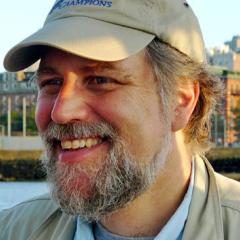About Rob's Work
Rob Moir, PhD, directs the Ocean River Institute. “Ocean river” is a term used by Homer and Rachel Carson to describe the connectedness of the natural world. It symbolizes the folly in attempting to separate ocean, river and watershed, which truly are linked as one. We believe in a more inclusive and holistic perspective in environmental conservation. To draw boundaries among ecosystems is not the way of the salmon, the eel, otter or osprey. Instead, we all must recognize the permeability of natural boundaries, as Carson did. ORI believes that we must follow Carson’s lead to better understand the complex relationships among oceans, shores, rivers and watersheds, and make environmental decisions based on this greater understanding. The Ocean River Institute operates based on the justice belief that many environmental issues can be addressed best by people taking action in their own communities and regions, not by national or international entities. In this respect, ORI’s work is grounded in the principle of subsidiarity. Subsidiarity is an organizing principle that matters ought to be handled by the smallest, lowest or least centralized competent authority. We believe that many environmental issues can best be addressed by people taking action in their own communities and regions, not by large, national entities. But small, localized, or newly formed groups often need help to achieve their goals. That's where the Ocean River Institute comes in. We maintain a network of ORI Partners, connecting them with resources and services to help them maximize their impact, expand their capacity, and weather unanticipated setbacks. ORI Actions and Events offer opportunities to make a difference, and you can volunteer to be an ORI Steward. The Ocean River Institute is first to practice environmental subsidiarity in collaboration with others, to assist groups closest to wildlife and natural areas, to educate more widely, and to advance ecosystem-based adaptive management with greater public participation.
